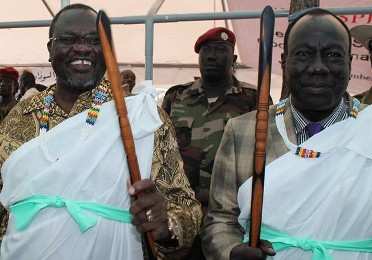SPLM-IO committed to security arrangements implementation: official
October 22, 2015 (ADDIS ABABA) – Officials of the South Sudanese armed opposition faction (SPLM-IO) have reaffirmed their commitment to the implementation of the security arrangements contrary to accusations by the government that the former had been dragging their feet in implementing the peace deal signed in August by the rival parties.

Juba military delegation in September signed the minutes of the workshop organized in the Ethiopian capital, Addis Ababa, by the IGAD mediation, which aimed at determining the sizes and compositions of joint forces to be stationed in the national capital, Juba, and other state capitals and major towns per the peace agreement.
The workshop also discussed selection of locations of cantonment or assembly points of the two rival forces before the process of unifying them could take place and run for at least 18 months of the 30 months of the agreed transitional period before elections are held.
The parties also discussed establishment of a joint command for the would-be joint forces in the capitals that will serve as the nucleus for the further unification of the rival armies across the country.
In their previous interaction from 13-18 September in Addis Ababa, the two parties agreed on a number of locations for the assembly purposes but could not agree on sizes and compositions of joint forces, prompting the SPLM-IO to reject the signing of the minutes and demanded further deliberations and adoption.
Officials of the SPLM-IO have however refuted the perception, insisting that their demand to further deliberate on the minutes for adoption did not amount to non-commitment to the security arrangements.
“We are committed to the full implementation of the peace agreement. You will recall that our leadership was the first to sign the peace agreement on August 17, 2015, in order to end the suffering of our people,” James Gatdet Dak, opposition leader’s official spokesman, told Sudan Tribune on Thursday.
“The SPLM/SPLA (IO) and its leadership are committed to the implementation of the security arrangements. We understand that implementing the security arrangements is the entry point to the implementation of the rest of the peace agreement,” he said.
But Dak said the peace agreement clearly had called for demilitarization of the capital, Juba, and other state capitals and major towns, but added “unfortunately” the IGAD imposed agreement has not specified the sizes and compositions of the joint forces from the army and police including the presidential guards.
He further narrated that since the peace agreement called for demilitarization, the SPLM-IO was demanding that the number of forces to be maintained or deployed in Juba must not be a huge force, and the composition should be equal from the rival forces.
The media official however expressed optimism that the two parties may soon reach an agreement on the contentious issues in the security arrangements as the discussion on the matter has resumed in Addis Ababa and will run from 21-26 October, 2015.
“As soon as there will be understanding on the contentious issues, our leadership will begin to compose an advance team to travel to Juba to jump start the implementation of the peace agreement on the ground,” he further reassured.
He however questioned the intention of the government for demanding “several thousands” of armed forces to remain in Juba and to also “besiege” the national capital from all directions by planning to block all major roads to and fro Juba.
South Sudan army (SPLA) last month announced that it will implement the provision in the agreement which demanded that its forces must be withdrawn 25km away from Juba. It proposed it will redeploy forces on all major roads leading to Juba, including Juba-Mundri, Juba-Yei, Juba-Nimule, Juba-Torit, Juba-Bor and Juba-Terekeka roads.
With the exception of units of military and police forces to take part in the joint forces in the national capital, other forces belonging to the opposition fighters will be assembled in locations hundreds of kilometres away from Juba, mainly in the greater Upper Nile region.
The opposition’s spokesman said the matter was “sensitive” for the security of the leadership, members and supporters of the SPLM-IO, adding that selection of new army locations around Juba will also be tackled in the ongoing military workshop in Addis Ababa.
(ST)
